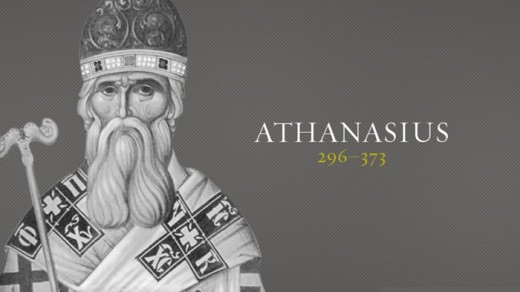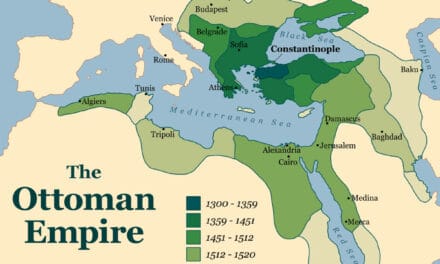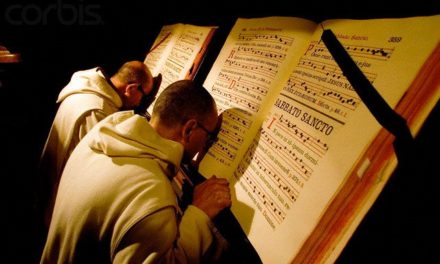This week’s episode is titled, “Contra Munda”
In our last episode we noted how the Emperor Constantine hoped Christianity would be a unifying influence in the far-flung & troubled Roman Empire. But as soon as he & his co-emperor Licinius passed the Edict of Milan granting religious tolerance to all the Empire’s subject, the doctrinal & theological debates that had been in place for years began to surface.
When the Church was being hammered by persecution prior to Constantine, Christians had a more imminent threat to deal with. But now that persecution was lifted, secondary issues moved to the foreground.
As we saw at the conclusion of the last episode, the Donatists of North Africa asked the Emperor to mediate their dispute with their non-Donatist adversaries. At the Council at Arles, the Donatists lost the debate over whether or not lapsed church leaders could be reinstalled. When they refused to capitulate, Constantine sent troops to Carthage, the lead church in N Africa, to enforce his will. For the first time, the power of the State was used to enforce Church policy on other Christians.
An interesting aside from the Council of Arles was the presence of 3 bishops from Britain. This gives us an idea how far the Gospel had penetrated by the beginning of the 4th C.
But the Donatist Controversy wasn’t the only or near the largest debate that would engulf the Church at that time. The biggest doctrinal challenge facing the Church was how to understand the person of Jesus Christ. A pastor of a church near Alexandria, Egypt named Arius became the champion for a position which said Jesus was human but not God.
As we embark on this chapter in Church History, let me begin by saying it was in these early years, as church leaders wrestled with the identity of Christ and His relation to man & God, that the theological groundwork was laid for what we hold today as Orthodoxy. It took many years & several Councils before the Church Fathers worked out the right wording that captures the essence of what we now call orthodox doctrine. Getting there was no easy trip. The journey was fraught with great trouble, distress, and at times, bloodshed. It began with a debate over the nature of Christ; was He God, man, or both? If both, how are we to understand Him; did He have 2 natures or 1 hybrid nature that merged the 2? And if Jesus is God, then how do we describe God as one, yet being both Father & Son? Oh – and don’t forget the Holy Spirit? How are we going to describe all this without saying something about God that’s untrue?
I warn you that as we carry all this into the 5th & 6th Cs, especially the discussions over how to understand the nature of Christ, we’re going to see some church leaders acting in a decidedly non-Christian manner. One of the Church Councils called to settle this matter ended up in a bloody riot! So hang on because we have some fun stuff ahead.
For now, realize what we’re looking at in this era of our review is a big deal and will frame the course of Church life over the next nearly 300 years.
How do I explain the debate as it emerged in the challenge Arius presented?
Well, because of their pagan background, many people didn’t believe God experienced emotions as humans experience them. Yet it’s clear from the Gospels Jesus did experience such emotions. Therefore, logic seemed to dictate Jesus could not have been divine, because if He was, then God experienced human emotions. Arius’ solution was that Jesus was God’s first & greatest creation. Denying that Jesus was eternal, he said, “Once, the Son did not exist.” Arius wanted to get his ideas into the public mind quickly so he set his doctrine to catchy little tunes & soon, many were singing his songs.
Arius’ position was popular among the common people who found the Christian doctrines of the Incarnation & the Trinity difficult. How could there be 1 God eternally manifest as 3 persons? Arius’ description of Jesus as a kind of divine hero beneath the 1 God fit more easily into their pagan background so they adopted his theology. While Arius’ teaching spread rapidly among his pagan neighbors, those with a keener awareness of the Bible opposed his aberrant views. They composed their own chorus that today is known as the Gloria Patri – “Glory be to the Father, and to the Son, and to the Holy Ghost; As it was in the beginning, is now and ever shall be, world without end.”
Alexander, the bishop of Alexandria, so Arius’ spiritual overseer, led the opposition to Arius and called together a group of Church leaders in 320. They reviewed Arius’ theology and declared it heretical. When Arius refused to back down, they excommunicated him. Arius then went to the Empire’s Eastern capital at Nicomedia & asked for the support of his friend, the bishop of the church there, a guy named Eusebius. Not the church historian Eusebius who lived at the same time.
The 2 most influential churches of the East were set in opposition to each other, Nicomedia, the political headquarters & Alexandria, the intellectual center. Because Arius had Eusebius’ backing he felt emboldened to return to Alexandria. When he did, there was rioting in the streets. But then, if you know anything about ancient Alexandria, rioting was a favored past-time. They rioted like we go to a ball game; it was public sport.
As the Arian Controversy spread, Emperor Constantine realized if he didn’t take action, instead of the Church providing much needed unity for the Empire, it would become one of the major sources of turmoil & unrest. In 325 he called Church leaders far & wide to attend a special council at the city of Nicea in modern Turkey, at his expense. Some 300 bishops managed to make it, enough to make the Council of Nicea a remarkable representation of the whole church. Many of those who attended bore the scars & marks of the Diocletian persecution. When they met, they found a throne set for the Emperor in the midst of the hall. He sat arrayed in richly jeweled robes befitting more an Eastern monarch than an Emperor of Rome.
Constantine assumed the Arian Controversy was merely a sematic debate; a petty brueha over words & that a meeting of the minds of Christians leaders was all that was needed to settle the dispute. Yeah, let’s just get every together in one place and talk it out man to man, face to face. Surely they’ll reach a compromise, right? à So, he commenced the council with a little pep talk about the importance of their task, then turned it over to them. The depth of his naivete was quickly revealed.
The account of the finding of the Council reveals that while the doctrinal issue raised by Arius was quickly resolved, it was how Arius was handled by Bishop Alexander that became the main point of debate.
Arianism was declared heretical. The Council affirmed both the deity & humanity of Jesus as the Son of God. Constantine urged his friend, Bishop Eusebius of Caesarea, the famous historian, to put forward his creed, his statement of faith as something the entire council could endorse as their united statement. But the Council didn’t find Eusebius sufficiently clear on his belief in the deity of Jesus and went instead with a creed offered by the Bishop of the Spanish city of Cordova, a man named Hosius, another favorite of the Emperor’s. Still, the Council dithered, & Constantine, with an empire to run, grew impatient & pressed the bishops to endorse what today we know as the Nicean Creed, the accepted standard of Roman & Eastern Churches.
I quote the Nicean Creed in full …
We believe in one God the Father Almighty, Maker of heaven and earth, and of all things visible and invisible.
And in one Lord Jesus Christ, the only-begotten Son of God, begotten of the Father before all worlds, God of God, Light of Light, …
Then comes the lines the Council wrote to specifically deal with the Arian error –
True God of True God, begotten, not made, being of one substance with the Father (remember that phrase; it’ll be important later) by whom all things were made; who for us men, and for our salvation, came down from heaven, and was incarnate by the Holy Spirit of the Virgin Mary, and was made man, and was crucified also for us under Pontius Pilate. He suffered and was buried, and the third day he rose again according to the Scriptures, and ascended into heaven, and sits on the right hand of the Father. And he shall come again with glory to judge both the living and the dead, whose kingdom shall have no end.
And we believe in the Holy Spirit, the Lord and Giver of Life, who proceeds from the Father and the Son, who with the Father and the Son together is worshipped and glorified, who spoke by the prophets. And we believe in only one holy, universal and apostolic Church. We acknowledge one baptism for the remission of sins. And we look for the resurrection of the dead, and the life of the world to come. Amen.
Only 2 of the 300 bishops present refused to sign the Creed. Along with Arius, they were exiled. Constantine assumed the Arian Controversy had been dealt with, so the Church would settle down and help him unite the realm. To mark the dawn of a new & glorious day of Church & State cooperation, Constantine held a huge banquet before the bishops headed home.
What a sight, these men bearing the scars of the previous emperor’s persecution, now the emperor’s celebrated guests, eating at his sumptuous table, reclining on his own couch! Guarded by his bodyguard. One man, missing an eye put out by Diocletian, was given special honor; Constantine even kissed the eyeless cheek!
But in the years that followed, some of those bishops were banished from their posts when they took umbrage at this or that imperial decision. A hierarchy grew up around Constantine, self-appointed advisors to the Emperor on the state of the Church. If they didn’t like a certain fellow, they accused him of some offense, and the newly anointed enemy was exiled with his replacement being someone more amenable to the accuser. And just as often as a bishop ran afoul of Imperial favor & was banished, just that quick he could be called back when Constantine replaced one set of advisors with another. The role of Church leader became a kind of musical chairs. In today, out tomorrow, back the day after, but keep your bags packed at all times.
An example of this is the career of Athanasius.
Athanasius was a young advisor to Bishop Alexander of Alexandria who led the opposition to Arius. Athanasius was a short & dark-skinned deacon his enemies referred to as the Black Dwarf. As a young man, he spent hours with his heroes, the monks in the wilderness outside Alexandria. The word monk means “alone” & they took their name from the isolation they pursued. Athanasius took it on himself to make sure they had food & supplies as they devoted themselves to God by literally fleeing the world.
Athanasius had a keen mind & lived a highly-disciplined life. Even at a young age his brilliance was respected and when Alexander made the trip to Nicaea for the famous Council, he took Athanasius with him. Not long after returning from Nicaea, Alexander fell ill & asked Athanasius to replace him. But Athanasius wanted to serve, not lead. So he fled to his desert friends, the monks. They convinced him of his calling to lead the Church & he returned to Alexandrian as Bishop. He was 33.
Constantine was loath to undo the findings of the Council of Nicaea, but he also knew the Arian position was still popular among many f the common folk. He thought it best that Arius be allowed to return to Alexandria as a member of the Church. Thinking that now that Alexander, the man who’d led the opposition was out of the way, Athanasius would knuckle under to Imperial authority and consent to Arius’ return. He couldn’t have been more wrong.
Athanasius locked horns with the Emperor & refused to budge, even when Constantine threatened to banish him. They battled for 5 yrs when finally the Emperor had enough & found Athanasius guilty of treason. In the 40 yrs Athanasius was bishop, he was banished & recalled 5 times as the winds of fortune & imperial favor shifted in the palace. At one point, he was so thoroughly out of political good will every one of his supporters deserted him. It was during this period he wrote & spoke of his devotion & unwavering loyalty to Jesus as the King above all earthly kings, saying that nothing could weaken his resolve to love & serve God, even if it meant, “Athanasius contra munda” = Athanasius against the world.
Remember just a moment ago when reading the Nicaean Creed, I mentioned to note the phrase that Jesus was of one substance with the Father. Not long after the Nicaean Council, a group of Church leaders decided to soften the Nicaean position & bring it a little toward the Arian view. They said Jesus wasn’t the SAME substance as the Father but was a SIMILAR substance. In Greek, it’s the difference of one letter’ between homo-ousios – same substance & the new terminology they advocated – homoi-ousios – similar substance.
As we’d expect, Athanasius led the classic Nicean interpretation of homo-ousios against the Quasi-Arians and their statement of homoi-ousios. While this may seem an insignificant difference to many of us, it proved to be of monumental importance. If the door was opened in even a small way to begin thinking of Jesus as somehow different in essence from the Father, it wouldn’t be long before His deity would be jettisoned entirely. Then we wouldn’t be following the Jesus of the Bible; the real Jesus of history. Athanasius’ lonely & steadfast determination to hold fast to what the Bible said about God, rather than go along with the politically-minded doctrine-massagers of his day is one of the most important & heroic moments, not just in Church history, but in all history. This was one of those moments when it seems truth hung by a thread; a thread only as think as the letter “i”.
We end this episode with this . . .
One of Constantine’s most important contributions to history was the relocation of his capital to Byzantium from the decayed husk of the once great but now worn-out & tired city of Rome. Byzantium was located at the geographical crossroads for the ancient world and it’s a wonder no one had recognized its strategic brilliance before this. It sits a the narrow neck of the Bosporus, linking E & W & controls the flow of maritime trade between the Black & Mediterranean Seas. Located not far from Diocletian’s Eastern capital at Nicomedia it meant an easy relocation of the capital. Constantine decided to turn the hundreds year old village into a bright shining new center of civilization and made a good start on the project before his death in 337. Because it was the Eastern capital, it also became a major center & headquarters of the Church, which would eventually vie with Rome for bragging rights over which church ruled the Christian world.
At Constantine’s death it was as if a message was sent to the frontiers it was time for Rome’s enemies to push her borders backwards. In Central Asia, the Huns pressed westward on the Goths, who in turn pressed in on Rome’s Eastern Frontier. Another group known as the Visigoths eventually made it all the way to Rome in 410 & sacked the city. Their leader was Alaric, who’d been influenced by Arianism.
Over the next years, other Easterners made their way across Europe, bringing more ruin. Each successive wave was like another slap to the face of once great Rome which by that time was little more than a punch-drunk & washed up has-been. The Franks, Alans, Vandals & Ostrogoths all took a turn knocking the Romans about.
The Vandals, who began their campaign of terror & pillage in the steppes of Asia, crossed the Rhine, plowed a deep furrow S into Spain, took ship to cross the Straits of Gibraltar & landed in N Africa where they heard fabulous wealth awaited. Furious that the riches they dreamed of weren’t there, they went on a rampage of destruction that’s bequeathed their name “Vandal” to later generations as meaning someone out to wreck wanton & pointless ruination.
One of the cities they laid siege to in N Africa was Hippo, where a Bishop named Augustine served as pastor. Augustine became one of the most important theologians of church history. He died during the siege by the Vandals. When they finally conquered & destroyed the city, the Vandals so respected Augustine they took pains to preserve his church & the extensive library he’d accumulated.
Augustine of Hippo is a towering influence in church history and one that we’ll return to in a future episode.






Just to let you know that on your website, episode 15 and 16 are out of order. This episode has been very helpful. Thanks!
Thanks Raul